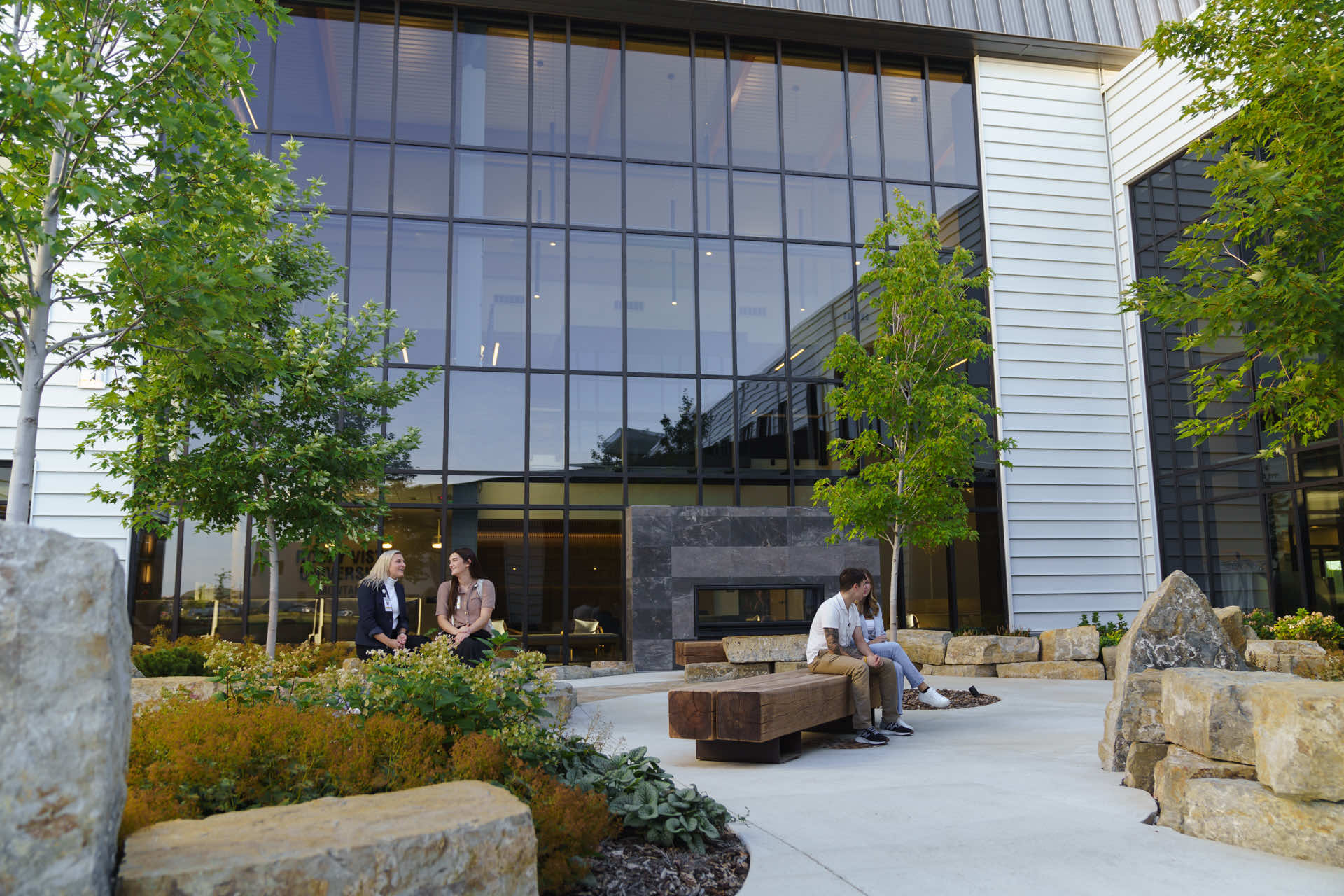Rocky Vista University – MCOM Program Details
Montana College of Osteopathic Medicine
Pioneer the future of the osteopathic philosophy with RVU-MCOM.
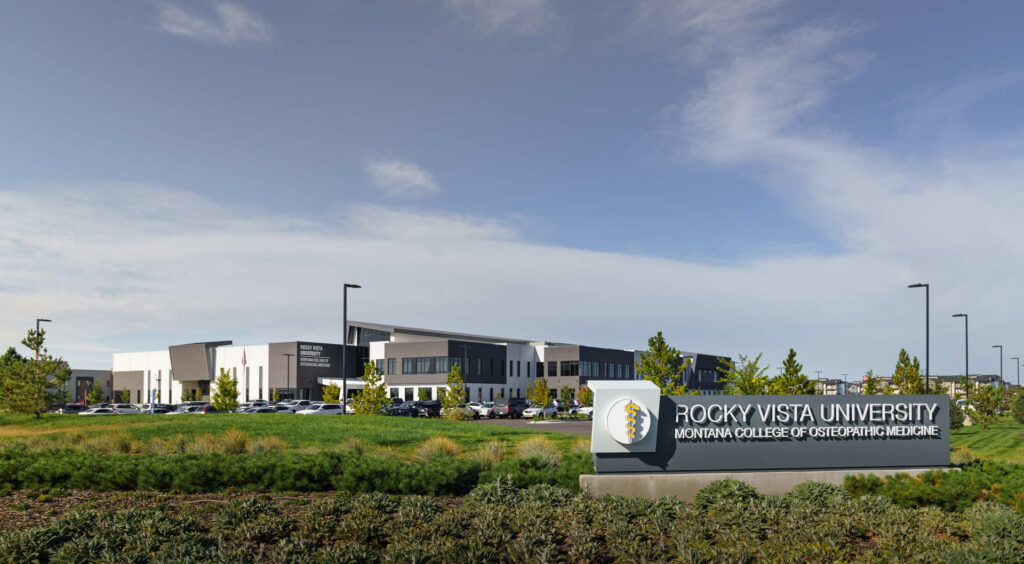
Why become a DO at Montana College of Osteopathic Medicine
RVU’s newest DO program, located in Billings, Montana, thrives on three firmly held principles: early osteopathic clinical skills integration, a supportive and active learning environment emphasizing health and wellness, and integrated simulations and skills-based curriculum that supports life-long professional growth.
4
Years
full time, in person
$69,736
2025-2026 Tuition
The Montana Campus
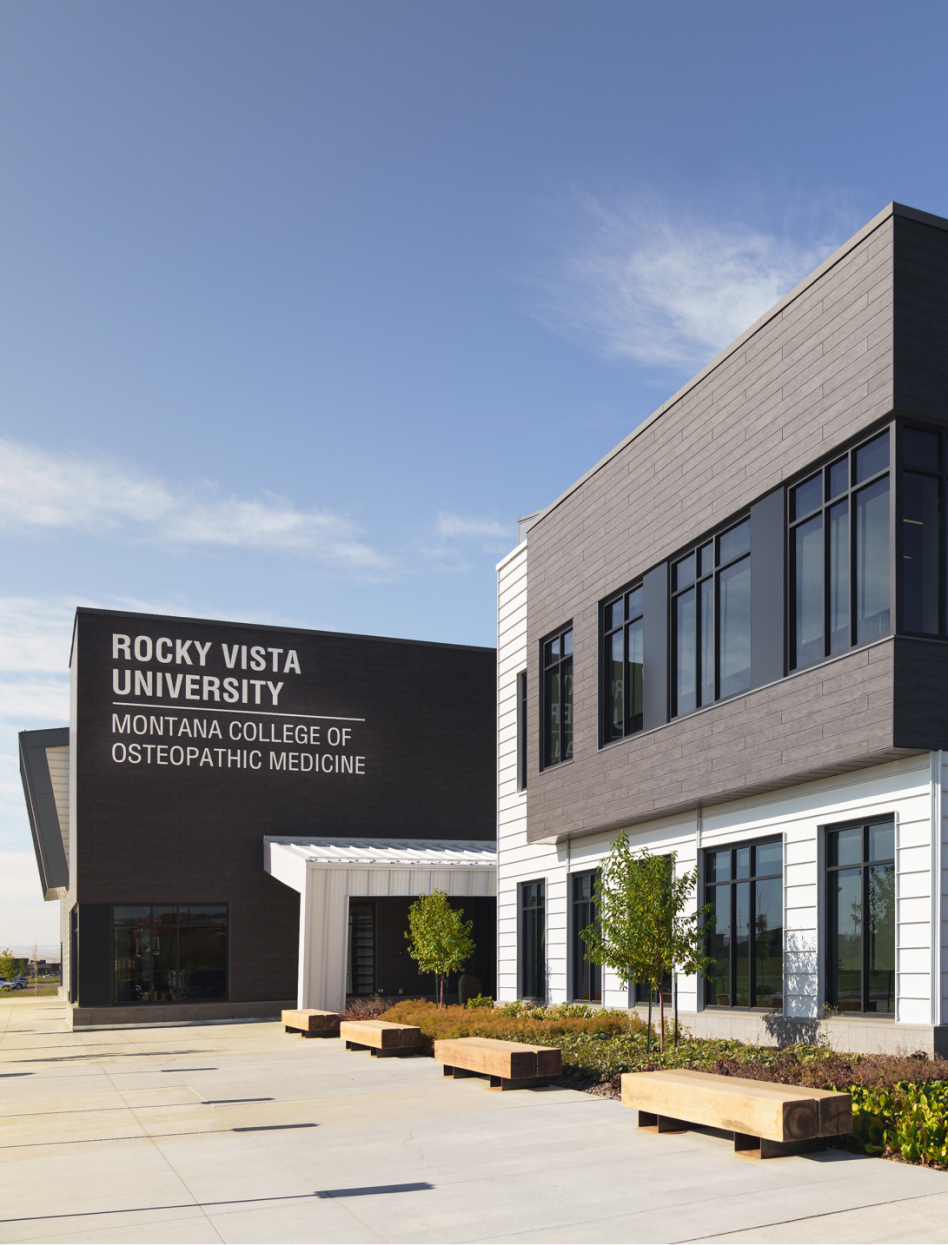
Montana Campus
Montana Campus
Billings, sitting along the Yellowstone River and the famous Rimrocks, is known as Montana’s Trailhead because it serves as the border between western Montana’s mountains and Eastern Montana’s plains and badlands. Billings is an urban city offering modern amenities, exceptional views, outdoor recreation, and award-winning cuisine. Billings is the medical hub for two thirds of Montana and portions of bordering states. Although Billings is the largest city in Montana, it boasts small-town hospitality! Where you can explore recreation, dining, shopping, and events happening in Billings.
Explore CampusBesides RVU-MCOM, you can also pursue your DO degree at the Rocky Vista College of Osteopathic Medicine (RVUCOM) Program, located in Colorado and Utah. There are two separate applications but it’s easy to apply to both MCOM and RVUCOM if you choose.
Program Goals and Outcomes
Mission
The mission of RVU-MCOM is to educate and inspire students to become highly competent osteopathic physicians and lifelong learners prepared to meet the diverse healthcare needs of tomorrow through compassionate service, relevant research, and innovative education.
Vision
RVU-MCOM’s vision is advancing osteopathic medicine through transformative education to elevate communities in the Mountain West and globally.
Values
RVU-MCOM adopts the RVU Institutional values: Collegiality, Compassion, Diversity, Equity, Excellence, Inclusivity, Innovation, Integrity, and Service.
Strategic Plan
Together, we will help you learn
Program Learning Objectives
Apply osteopathic principles and practices to patient care.
AOA CC#1: Osteopathic Philosophy/Osteopathic Manipulative Medicine – Demonstrate and apply knowledge of accepted standards in osteopathic manipulative treatment appropriate to the specialty. Remain dedicated to life-long learning and to practice habits in osteopathic philosophy and OMM.
Apply knowledge of biomedical sciences to clinical medicine.
AOA CC#2: Medical Knowledge – Demonstrate and apply knowledge of accepted standards of clinical medicine in the respective areas; remain current with new developments in medicine and participate in life-long learning activities.
Perform comprehensive patient care utilizing best practices of osteopathic medicine.
AOA CC#3: Patient Care – Demonstrate the ability to effectively treat patients and provide medical care that incorporates the osteopathic philosophy, patient empathy, awareness of behavioral issues, the incorporation of preventive medicine and health promotion.
Utilize effective communication skills to support positive patient-centered and inter-professional relationships.
AOA CC#4: Interpersonal and Communication Skills – Demonstrate interpersonal and communication skills that enable a physician to establish and maintain professional relationships with patients, families, and other members of health care teams.
Uphold principles of the Osteopathic Oath.
AOA CC#5: Professionalism – Uphold the Osteopathic Oath in the conduct of one’s professional activities that promotes advocacy of patient welfare, adherence to ethical principles, and collaboration with health professionals, life-long learning, and sensitivity to a diverse patient population; be cognizant of physical and mental health to effectively care for patients.
Evaluate patient-care practices through critical thinking using evidence-based medical principles.
Analyze health systems science to deliver individualized patient care.
AOA CC#7: Systems Based Practice- Demonstrate an understanding of health care delivery systems; provide effective and qualitative patient care with the system; and practice cost effective medicine.
Meet the people who can be by your side
At MCOM, we foster a close-knit community that is rooted in the RVU core values. This culture drives positive behavior that produces outstanding outcomes for our medical school. We are deeply committed to student success with our doors—and inboxes—always open and ready to help.
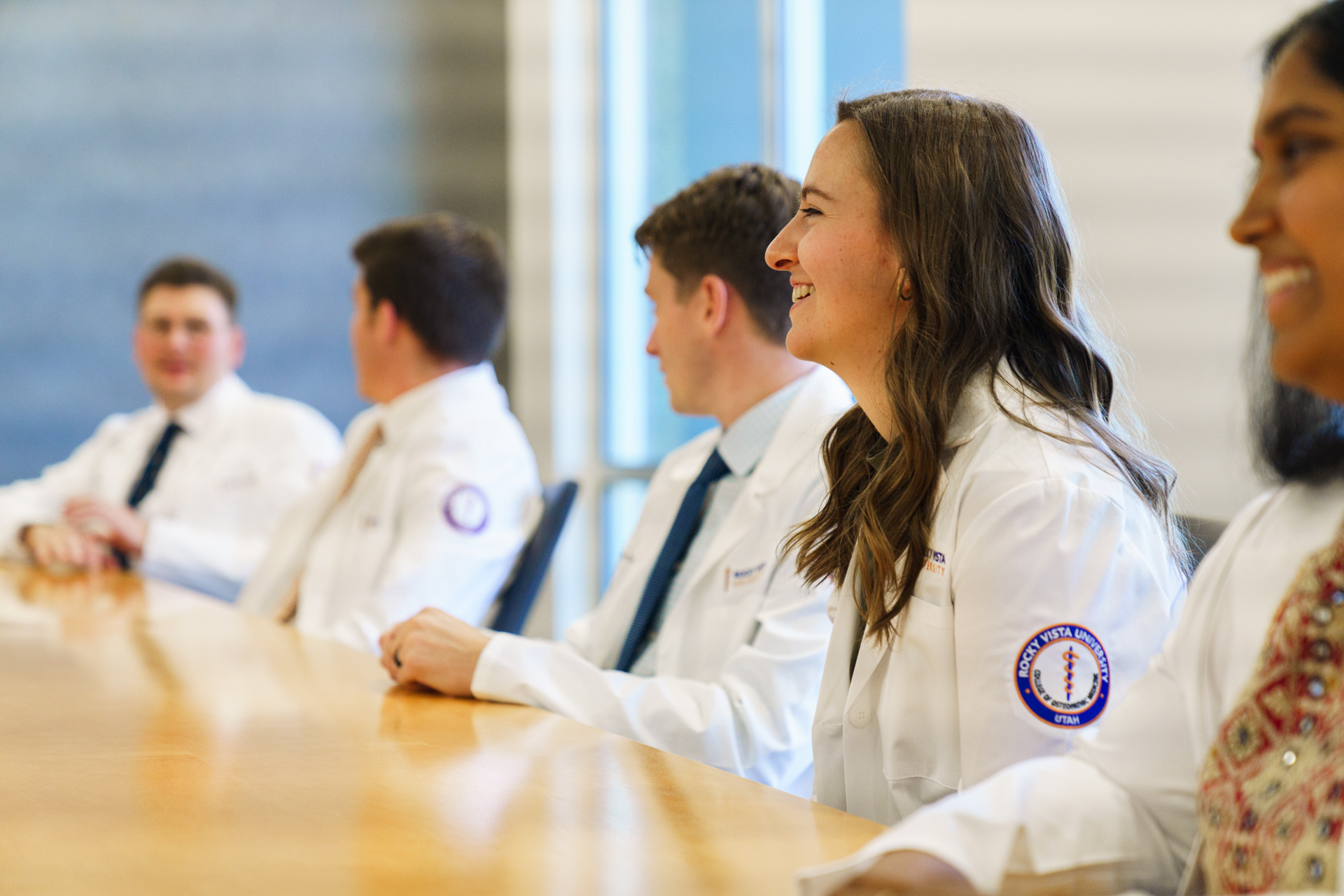
Ready to apply?
RVU’s Montana DO Program is currently accepting applications for the 2025-26 academic year. Head to our MCOM Admissions page to for more specifics on the admissions requirements and application process.
About Osteopathic Medicine
Osteopathic Medicine is a comprehensive healthcare profession that emphasize the following four tenets:
- The body is a unit; the person is a unit of body, mind, and spirit.
- The body is capable of self-regulation, self-healing, and health maintenance.
- Structure and function are reciprocally interrelated.
- Rational treatment is based on an understanding of these principles: body unity, self-regulation, and the interrelationship of structure and function
Doctors of Osteopathic Medicine (DOs) and their colleagues, doctors of allopathic medicine (MDs), are both licensed physicians qualified for the unlimited practice of medicine and surgery in the United States. So, in our ever-evolving world of patient-first care, what exactly is the difference? There are a few nuances, but here at RVU we like to so—DO’s do it all.
The curriculum and community at RVU enable each student to stay true to their individual values and pursue their greatest goals. Dive into the practice osteopathic medicine and see if a DO career path is right for you.
Application Requirements
Applicants must meet the following minimum requirements prior to application. Any requirement below that is not completed prior to submitting the CASPA application will not be considered for review:
Bachelor’s Degree
A bachelor’s degree or higher from a U.S. regionally accredited college or university must be completed prior to matriculation (exceptions may be made and will be reviewed on a case-by-case basis; including exceptions that pertain to faith-based and/or strong international universities).
Note: In the event of coursework completed at foreign institutions, official detailed course-by-course evaluations must be completed by an approved agency. Please see the list of approved agencies in the RVU Student Handbook and Catalog, under ‘Matriculation’ section
Coursework
Minimum prerequisite course work that must be completed prior to matriculation includes:
- Biology/Zoology (8 semester hours including lab)
- General Chemistry (8 semester hours including lab)
- Organic Chemistry (8 semester hours including lab)
- Physics (8 semester hours including lab)
- English or Literature (6 semester hours)
- Biochemistry (3 semester hours)
No grade below a “C” will be considered to fulfill requirements. C- is considered below a C and will not fulfill requirements. Additional upper-division coursework such as Human Anatomy, Physiology, Genetics, and Cellular Biology is highly recommended.
GPA
A minimum science and cumulative GPA of 3.0 as calculated on the AACOMAS application.
Note: The chances for admission for a candidate with minimal grades are limited. Admission would require outstanding achievement on the part of the candidate during their career or unique individual circumstances. Preference will be given to candidates with a science and cumulative GPA of 3.6 or higher. On average, candidates admitted to colleges of osteopathic medicine each of the past three years have GPAs greater than 3.6.
MCAT
MCOM requires candidates to take the Medical College Admission Test (MCAT). The MCAT must have been taken within 3 years prior to application. There is no minimum required score.
Letters of Recommendations
Three required letters (submitted to AACOMAS) include:
- A credentialed healthcare provider (DO, MD, PA, or NP) who supervised the candidate’s work (voluntary or paid) in a clinical setting in a clinical setting.
- An academic reference (order of preference to include Pre-Med Advisor or Committee, Basic Science Faculty, or anyone who can speak to the candidate’s ability to successfully complete a rigorous medical school curriculum).
- A letter of the candidate’s choice
Note, only the maximum number of letters submitted through AACOMAS will be considered. The Office of Admissions is not able to accept letters of recommendation sent directly to RVUCOM or from any other letter service, such as Interfolio or VirtualEvals.
Transcripts
Students must provide official transcripts from all colleges attended where a degree was earned prior to matriculation. In the event of coursework completed at foreign institutions, the applicant must submit official detailed course-by-course evaluations completed by an approved agency. A list of these agencies is available in the University Handbook & Catalog.
International Students
MCOM will consider international applications. Demonstrated English language proficiency is required during the interview; preference will be given to applicants who have previously attended a regionally-accredited college or university in the U.S.
MCOM DO Program Curriculum
The design of the MCOM curriculum is based on a proven systems-based integrated academic model that guides students to develop a holistic, osteopathic approach to medicine. Ultrasound and simulation training is incorporated as part of the core curriculum starting early in the first year. During the pre-clinical years, each system is studied twice, first with an emphasis on normal form and function in Year 1, followed by an emphasis on pathophysiology and a clinical approach to each system in Year 2.
Curated for clinical relevancy
Basic biomedical science disciplines are integrated with clinical sciences in a fashion that reflects clinical relevancy, rather than broken down into individual segregated disciplines. The overall curriculum is scheduled in system-based blocks with intervening periods dedicated to Clinical, Academic, Reflection, Enrichment, Scholarly Activity, and Integration (CARES-I). During CARES-I students have opportunities to integrate knowledge and to shift their focus to wellness, electives, tracks, and research.
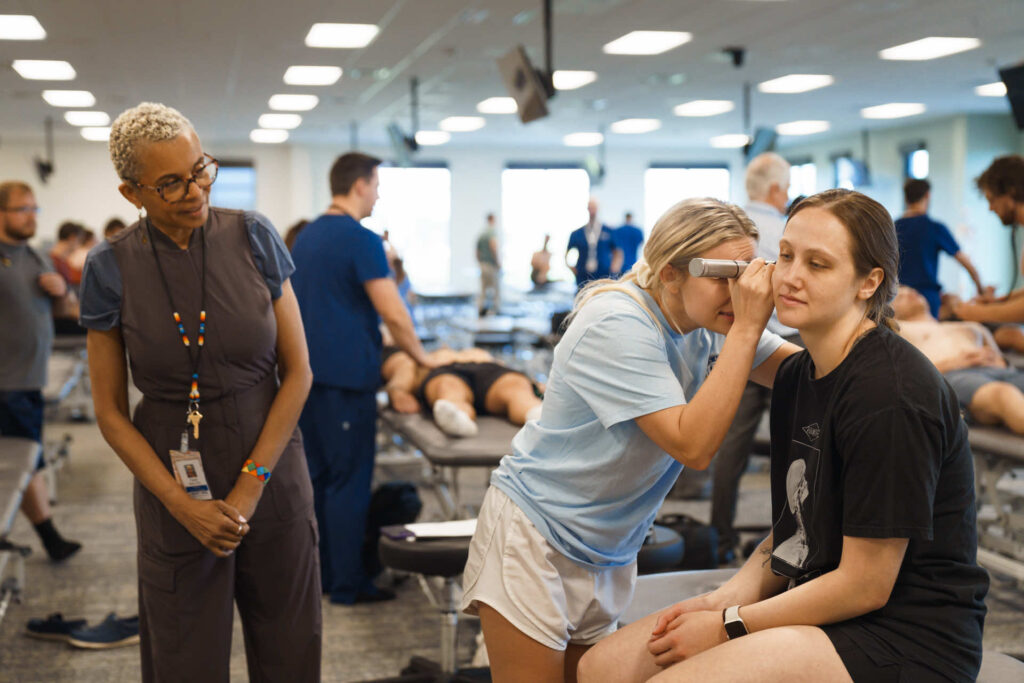

Hands-on and real-world ready
Students are exposed to clinical scenarios and immersive simulation events beginning in the first semester and continuing throughout the first two years of coursework, giving them the opportunity to prepare for the “real world” of medicine. We believe that early osteopathic clinical skills training, related simulation experiences, and active learning in team or small group settings, we strengthen students’ ability to think critically, appreciate the relevance of biomedical sciences, solve clinical problems and develop the clinical skills required to be exceptional future physicians.
Third and fourth-year students will receive their clinical training within RVU’s vast and growing clinical training network. The curriculum fulfills our mission of training students who are competent and ready to enter graduate medical education (residency programs).
A whole professional network at your educational service
MCOM has dedicated faculty and support staff who are physically located in the medical school campus in Billings. Special tracks and electives further distinguish MCOM students in the fields of military medicine, global medicine, rural medicine, research, and physician leadership. Affiliated agreements have been established with healthcare systems, hospitals, clinics, and medical groups throughout the state and in other regions.
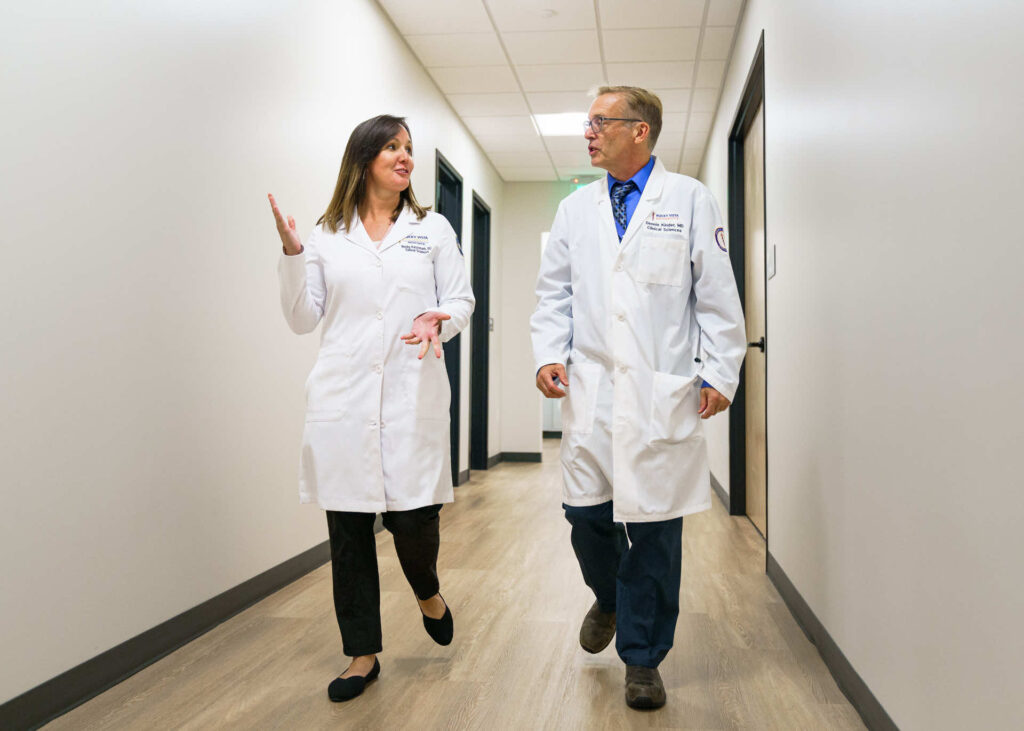
Estimated costs for your DO Degree in Montana
MCOM Courses
| Class | Credits |
|---|---|
| Foundations I | 3 |
| Osteopathic Clinical Skills I | 7 |
| Molecular and Cellular Mechanisms | 3 |
| Musculoskeletal System I | 6 |
| Cardiovascular/Respiratory System I | 5 |
| Microbiology, Immunology, and Infectious Disease | 6 |
| Class | Credits |
|---|---|
| Osteopathic Clinical Skills II | 7 |
| Gastrointestinal System I | 3 |
| Renal System l | 3 |
| Endocrine/Reproductive System I | 5 |
| Neuroscience System I | 8 |
| Transition to Clinical Medicine | 3 |
| Class | Credits |
|---|---|
| Foundations II | 1 |
| Osteopathic Clinical Skills III | 7 |
| Behavioral Health | 2 |
| Cardiovascular/Respiratory System II | 7 |
| Renal System II | 5 |
| Gastrointestinal System II | 4 |
| Class | Credits |
|---|---|
| Osteopathic Clinical Skills IV | 7 |
| Endocrine System II | 3 |
| Reproductive System II | 3 |
| Neuroscience System II | 4 |
| Musculoskeletal System II | 3 |
| Hematologic/Lymphatic System II | 3 |
| Pre-Clinical Capstone | 1 |
MCOM Board Pass Rates*
MCOM requires student doctors to successfully pass the national exams COMLEX-USA Level I and COMLEX-USA Level II CE (Cognitive Evaluation). Graduates are required to take the COMLEX-USA Level III when in residency. The table below reflects first-time pass rates for MCOM and the national pass rates.
| Graduation Date | Complex I MCOM Pass Rate | Complex I Nat’l Pass Rate | Complex II MCOM Pass Rate | Complex II Nat’l Pass Rate | Complex III MCOM Pass Rate | Complex III Nat’l Pass Rate |
|---|---|---|---|---|---|---|
| Class of 2027 | – | – | – | – | – | – |
MCOM Residency Placements*
| Year | % of Attempted | % of Attempted | Total Students Placed |
|---|---|---|---|
| TBD | – | – | – |
Program FAQs
Are AP or IB credits accepted for prerequisite courses?
Can I apply to MCOM and RVUCOM at the same time?
Yes. MCOM and RVUCOM are separate medical schools. Each has its own application.
Can I get a tour of MCOM?
Guided tours will be provided during the accepted student visit dates. The brand new MCOM campus is expected to be completed in January 2023.
Do I have to have all the prerequisite courses complete prior to submitting my application?
No, but all prerequisite courses must be completed prior to matriculation.
Does MCOM accept international students?
Not currently. However, it is anticipated that MCOM will receive approval in the future.
Does MCOM have pathway programs developed with any undergraduate institutions?
Yes. pathway programs are currently under development with Rocky Mountain College, Montana State University – Billings, and Carroll College. Further, RVU-Montana will also offer a one-year, on-campus, Master of Medical Sciences degree.
How can I apply for the Armed Forces Health Professions Scholarship Program (HPSP)?
The Military Health Profession Scholarship Program is offered through the U.S. Army, Navy and Air Force. This scholarship program helps cover direct educational costs and provides a monthly stipend to each recipient. In return, there is a service commitment of one year of active duty service for each year of participation in the program, with a minimum commitment of three years.
How do I apply to MCOM?
MCOM participates in the American Association of Colleges of Osteopathic Medicine Application Service (AACOMAS) for the receipt and processing of applications. Applications are submitted electronically through AACOMAS (click here).
If I get accepted, how much do I have to put down for deposit?
Payment of three non-refundable deposits totaling $2,000 (deposit #1 – $250, deposit #2 – $750, deposit #3 – $1,000). Deposits will be applied to tuition.
MCOM follows the guidelines set forth by the American Association of Colleges of Osteopathic Medicine (AACOM) relative to deposit due dates.
Is MCOM an accredited medical school?
MCOM is accredited by the Commission on Osteopathic College Accreditation (COCA) of the American Osteopathic Association (AOA). RVU has regional accreditation from the Higher Learning Commission (HLC), a commission of the North Central Association of Colleges and Schools.
What are the minimum GPA requirements for admission to MCOM?
A minimum science and cumulative GPA of 3.0
Note: On average, candidates admitted to RVUCOM (CO + UT) each of the past three years have GPAs greater than 3.6
What are the prerequisite courses for admission?
Biology (12 semester hours including lab)
General Chemistry (8 semester hours including lab)
Organic Chemistry (8 semester hours including lab)
Physics (8 semester hours including lab)
English or Literature (6 semester hours)
Social or Behavioral Sciences (6 semester hours)
Biochemistry (3 semester hours)
No grade below a “C” will be considered to fulfill requirements. Additional upper-division coursework such as Human Anatomy, Physiology, Genetics, and Cellular Biology is highly recommended.
What is the application deadline?
MCOM’s deadline for submitting an AACOMAS application is March 15, 2023. Applications are evaluated on a rolling basis, therefore it is in an applicant’s best interest to apply early in the process.
What is the MCOM class size?
MCOM plans to accept 80 students in 2023, 120 students in 2024, and 160 every year after that.
What kind of student support does MCOM offer?
MCOM will provide a wide range of resources, opportunities and services to enhance student experience at MCOM including academic advising, tutoring, career advising and planning, student interest groups, student government, wellness activities, mental health counseling, and disability and accommodations support.
These programs and services will be rolled out over a period of time and may not be available immediately upon opening.
Where will MCOM students do their clinical training?
Third and fourth-year students are placed at one of our regional training sites throughout the state and region to ensure continuity and coordination of clinical education within RVU’s vast and growing clinical training network
Who do I contact for more information?
For more information, contact the MCOM Admissions team at 406-901-2701 or [email protected]
Will MCOM have cadaveric dissection?
MCOM will have a full gross anatomy dissection lab with 16 cadaver tanks. Students will get the full surgical dissection experience during gross anatomy lab with approximately 5 students per cadaver. In addition, MCOM will have an additional lab for virtual dissection so students get a comprehensive gross anatomy educational experience.
Will MCOM have in-person or virtual interviews?
All MCOM interviews will be conducted virtually for the 2022-23 application cycle. Upon receiving an offer of acceptance, MCOM will host in-person student visit days on our campus. The visit days will be a fun and engaging opportunity to tour the MCOM campus and the surrounding Billings area, and get to know MCOM faculty, staff, and Billings community leaders.
Will MCOM offer the same tracks as RVUCOM (CO, UT)?
We anticipate having many of the same tracks offered at RVUCOM including, Global medicine, military medicine, physician scientist, rural and wilderness medicine, academic medicine and leadership, and digital health. The MCOM faculty are exploring additional tracks and elective courses specific to MCOM.
These programs and services will be rolled out over a period of time and may not be available immediately upon opening.
Will MCOM share faculty with RVUCOM (CO, UT) or have its own faculty?
MCOM is a self-reliant branch campus of RVUCOM which is required to have its own local faculty. MCOM faculty will enjoy all the same employee benefits with RVU faculty from all campuses but will have its own governance structure on the Montana campus. Guest lecturers from RVUCOM and other medical schools may be invited to teach at MCOM periodically.
Will MCOM share the same curriculum with RVUCOM (CO, UT)?
MCOM will have its own customized version of the RVUCOM curriculum, which will be administered independently. RVUCOM (CO, UT) has a proven history of outstanding curricular and national board outcomes, as well as residency placement outcomes. Since MCOM shares the same mission, MCOM has chosen to adopt the RVUCOM curriculum as its foundation but will integrate more simulation, ultrasound, and other active learning and student well-being programming. The brand new 138,000 SF facility was intentionally designed for this purpose.
These programs and services will be rolled out over a period of time and may not be available immediately upon opening.
Will student housing be available for MCOM students?
There are many housing opportunities available near the MCOM campus.
Explore helpful program information
What is a DO?
Dr. Andrew Taylor Still, Founder of Osteopathic Medicine
The philosophy of osteopathic medicine originated from the teachings of Virginian Andrew Taylor Still more than 100 years ago and is based on the belief that, given the optimum conditions, the human body has the amazing ability to heal, that the structure of the human body is directly related to the function, and that the health of the individual is related to the body, mind, and spirit.
What is Osteopathic Medicine?
Doctors of Osteopathic Medicine (DOs) are one of the only two groups of physicians who are licensed and qualified for the unlimited practice of medicine and surgery in all 50 states. DOs, like their colleagues, MDs, or doctors of allopathic medicine, provide professional services to advance the health and wellbeing of patients across this country and around the world.
Osteopathic physicians complete four years of medical school and three to seven years of resident training before entering practice. The practice of osteopathic medicine and the practice of individual osteopathic physicians is as diverse as the wide spectrum of professionals who chose the profession. DOs practice as specialists in all medical disciplines, in educational institutions, in research facilities, and public health institutions. They provide health care services in hospitals and clinics across the nation, utilizing the spectrum and all of the tools of modern medicine.
DOs place an emphasis on wellness and preventive medicine. Their training and philosophy also teach them to place an emphasis on the interrelationship of structure and function. By utilizing a patient center style of practice, DOs work with their patients to foster healthy lifestyles that concentrate on preventing illness, not merely treating pathology. Utilizing Osteopathic Manipulative Treatment (OMT), DOs support and augment the body’s natural ability to heal itself.
Osteopathic medicine has a century-old tradition of caring for diverse groups of people, often in rural and underserved settings. The profession honors its history and heritage by maintaining an emphasis on the total patient, on serving those in need, on the relationship between structure and function, and by avoiding concentration on the disease rather than the patient.
What DOs Bring to Medicine
The osteopathic profession prepares students to practice in all disciplines of medicine, with an emphasis on primary care and community-based medicine. DOs practice a “patient-centered” approach, which recognizes that the physician must address the patient’s sociological and psychological universe in order to improve the quality and duration of their life.
Osteopathic physicians concentrate on disease prevention and health promotion, believing that this approach is the basic path to wellness for their patients. DOs receive extra training in the musculoskeletal system–your body’s interconnected system of nerves, muscles, and bones that make up two-thirds of your body mass. This training provides osteopathic physicians with a better understanding of the way that an illness or injury in one part of your body can affect another.
Osteopathic manipulative treatment (OMT) is incorporated into the training and practice of osteopathic physicians. With OMT, osteopathic physicians use their hands to diagnose illness and injury and to encourage your body’s natural tendency toward good health. By combining all other available medical options with OMT, DOs offer their patients the most comprehensive care available in medicine today.
Outside Resources
American Association of Colleges of Osteopathic Medicine (AACOM)
American Osteopathic Association (AOA)
Technical Standards
Technical Standards Required of Matriculates
Rocky Vista University Doctor of Osteopathic Medicine (DO) Programs Technical Standards Required for Admission, Matriculation, and Progression
Introduction
Rocky Vista University (RVU) maintains a strong institutional commitment to equal educational opportunities for qualified applicants and students with disabilities. We collaborate with students to develop innovative ways to ensure accessibility and strive to create a respectful, accountable culture through our confidential and specialized disability support. Technical standards are required to engage in the program fully. Students’ competency related to learning objectives throughout and pertaining to their level of education will be addressed by the individual program. These technical standards are not intended to deter any candidate for whom reasonable accommodation will allow the fulfillment of the complete curriculum. RVU encourages students with disabilities to disclose and seek accommodations.
Seeking Americans with Disabilities Act (ADA) Accommodations
Prospective and enrolled students seeking accommodations engage in an interactive and confidential process with a Disability Officer to determine reasonable accommodations to ensure equal access. This process is informed by RVU’s commitment to inclusive excellence and the knowledge that students with varied types of disability can become successful healthcare professionals. Students are encouraged to submit requests for reasonable accommodations as early as possible, given the time required to process those requests. Accommodations may not be applied retroactively and may not fundamentally alter the nature and objectives of the program. Additionally, accommodations are generally not provided while requests are being reviewed/processed. Therefore, early disclosure is strongly encouraged for those requesting disability-related adjustments or modifications.
If you are an applicant, accepted student, or enrolled student with a disability who may require accommodations, we encourage you to contact the Office of Disability Services via [email protected]. Additional information regarding disability resources at RVU is available on our website.
Fulfilling Technical Standards
RVU approaches technical standards and accommodations on a non-discriminatory basis that is consistent with our values of equity and inclusion. This approach is also in accordance with legal requirements as outlined in the Americans with Disabilities Act of 1990, the Americans with Disabilities Act, as amended, and the Rehabilitation Act of 1973, as amended. To matriculate and remain in an RVU educational program, the specific program’s technical standards (delineated below) must be met with or without reasonable accommodations (i.e., students who have and students who do not have accommodations must meet all applicable technical standards). Students must be able to participate in all required activities necessary to meet the educational objectives of each course and of the collective program. While enrolled at RVU, fulfilling the technical standards does not guarantee that an applicant, student, or graduate will be able to fulfill the technical requirements of any specific residency program, employment, future training programs, or other pursued opportunities.
DO Programs Technical Standards
Immunizations
Students must satisfy all requirements for immunizations at the time of admission and throughout their time as an RVU student. Failure to do so will prevent matriculation or, in the case of an enrolled student, lead to dismissal. For specific information, please see “Health Records/Immunizations” of the Student Educational Records section of this Handbook.
Observation
Students must be able to obtain, gather, and synthesize information in didactic and clinical settings. This includes but is not limited to lectures, lecture supplemental materials, labs, physical exams, interviews, and raw diagnostic representations of physiologic data (e.g., radiology images, echocardiogram, ECGs, lab results, microscopic images). Students must have the individual capacity to assess a patient and evaluate findings accurately. These skills require the use of vision, hearing, and touch, or their functional equivalents.
Communication
Students must be able to communicate with others to elicit information, to detect changes in mood and activity, and to establish a therapeutic relationship. Students must exhibit interpersonal skills to accurately communicate with others. Students must be able to clearly, accurately, and sensitively record information obtained through communication. Students must demonstrate effective communication, participation, and collaboration with all members of a multidisciplinary health care and educational team across various communication mediums (e.g., in-person, Zoom, written). English is the primary language of the RVU DO curriculum, and students are expected to have a level of proficiency that eliminates language as an access barrier.
Motor
Due to the clinical nature and the training of an Osteopathic physician, all students must have coordination of both gross and fine muscular movements, balance, and equilibrium. All students must have the capacity to perform tactile examinations and osteopathic manipulative techniques in a manner that ensures patient and provider safety. Students must have the capacity to experience, collect, interpret, and understand tactile diagnostic exercises and manipulative treatments. Examples of this in the curriculum may include (but are not limited to):
- Maneuvering a patient during diagnosis and treatments, including being able to lift or maneuver at least 40lbs
- Reaching around a patient to perform certain techniques
- Bracing/stabilizing a patient’s mass during treatment
- Meeting isometric forces approximating 20lbs
- Providing high velocity thrust over 1 cm of distance under control while maintaining palpatory discretion
- Utilizing exam equipment effectively and safely (including but not limited to ultrasound probe, otoscope, stethoscope, sphygmomanometer)
Intellectual, Conceptual, Integrative, and Quantitative Abilities
Students must possess conceptual, integrative, and quantitative abilities, including measurement, calculation, reasoning, analysis, and synthesis. Problem solving, the critical skill necessitated by all RVU programs, requires these intellectual abilities. In addition, students must be able to observe and comprehend three-dimensional relationships and to understand the spatial relationship of structures. Students must be able to be present, engage, and participate in all required activities to the extent necessary to achieve all activity objectives and outcomes. Students must be capable of extended periods of intense concentration and attention.
Behavior and Social Abilities
Students must have the emotional health required for full use of their intellectual abilities, the exercise of good insight and judgment, and the prompt completion of all responsibilities attendant to the demands of the educational program. Students must have the capacity to develop mature, sensitive, and effective relationships with members of the internal and external RVU community (e.g., peers, faculty, staff, patients, health care professionals). Students must be able to successfully function as part of a healthcare team and participate in a multi-disciplinary environment. Students must be able to accept constructive feedback, demonstrate accountability and take personal responsibility for improving personal performance and team interactions.
Students must be able to tolerate physically and mentally taxing workloads and to function effectively under stress. They must be able to adapt to changing environments, display flexibility and professionalism, and have the capacity to function successfully and perform in the face of uncertainties inherent in the clinical nature of the RVU DO program. Due to the tactile nature of Osteopathic education, students are required to participate both as patients and as trainees in the curriculum (e.g., OPP laboratory, PCM laboratory) and examine/be examined by their peers.
Ethical and Legal Responsibilities
Students must maintain, demonstrate, and display high ethical and moral behaviors commensurate with being a productive, compassionate, professional member of society in all interactions (e.g., faculty, staff, peers, patients, the public). Students are expected to have the cognitive ability to understand the legal and ethical aspects of their chosen profession and the capacity to act according to the relevant laws and ethical standards.
Physical Interactions
As an osteopathic medical student, you will be expected to touch people of different genders, races, and body types as part of your required training to become an osteopathic physician. Reciprocally, you will also be expected to be touched by other RVU medical students as part of physical assessment and treatment skills training during osteopathic clinical skills labs. In addition to ADA accommodations, exemptions to this requirement may also be granted based on religious accommodations.
Accreditation Status
Rocky Vista University Professional Licensure Disclosure Statement
College of Osteopathic Medicine
Rocky Vista University College of Osteopathic Medicine (RVUCOM and MCOM) is an American Osteopathic Association (AOA) accredited program of study. Graduation from an AOA Commission on Osteopathic College Accreditation (COCA) accredited college of osteopathic medicine is required in order to begin training in an AOA or ACGME (Accreditation Council for Graduate Medical Education) residency program to which he or she has been accepted, and to take the COMLEX-USA Level 3 examination. RVUCOM and MCOM has determined that the Doctor of Osteopathic Medicine program curriculum offered at the RVUCOM Colorado and Utah campuses, and Montana (MCOM) meets the state educational requirements for licensure or certification in all U.S. states and each U.S. Territory.
RVU strongly encourages students to determine any additional requirements for licensure in the state in which they seek to practice osteopathic medicine. Students should refer to the individual state licensing bodies, as well as the Federation of State Medical Boards or the Physician Licensing Service for requirements for licensure. For licensing board contact information, please go to: https://www.fsmb.org/fcvs/participating-boards-for-physicians or https://osteopathic.org/life-career/licensure/state-licensure
Revision 04.05.2023
RVU-MCOM Maximum Length of DO Degree Completion Policy
Policy Statement:
Single-degree D.O. students must complete the D.O. degree within six (6) years of matriculation (150% of the standard time to achieve the degree).
Students must complete all the requirements for graduation, including the passing of required examinations within six (6) years of their initial matriculation into the COM or they will be dismissed from the COM.
Message from the Dean
Achieving greatness is an ongoing journey, driven by reflection, growth, and innovation. At the Rocky Vista University Montana College of Osteopathic Medicine (RVU-MCOM), we are a community of educators and learners committed to providing an outstanding medical education. Our focus extends beyond academics—we are deeply devoted to student wellness and fostering a strong sense of belonging.
Located in Billings, Montana, surrounded by the history, traditions, and beauty of the Mountain West, RVU-MCOM offers a dynamic environment where students can thrive. Our curriculum is designed to push medical education forward with cutting-edge innovations, including advanced simulation, ultrasound training, and immersive learning experiences.
At RVU-MCOM, our culture is rooted in the core values of excellence, diversity, innovation, collegiality, compassion, integrity, and service. We strive to prepare our students not only to excel in patient care but to become compassionate, service-oriented professionals who make a lasting impact in their communities.
We are excited to welcome you to our campus and look forward to learning and growing together.
Sincerely,
John E. Moore, DO, MPH, DABFM, FAAFP
Dean of MCOM
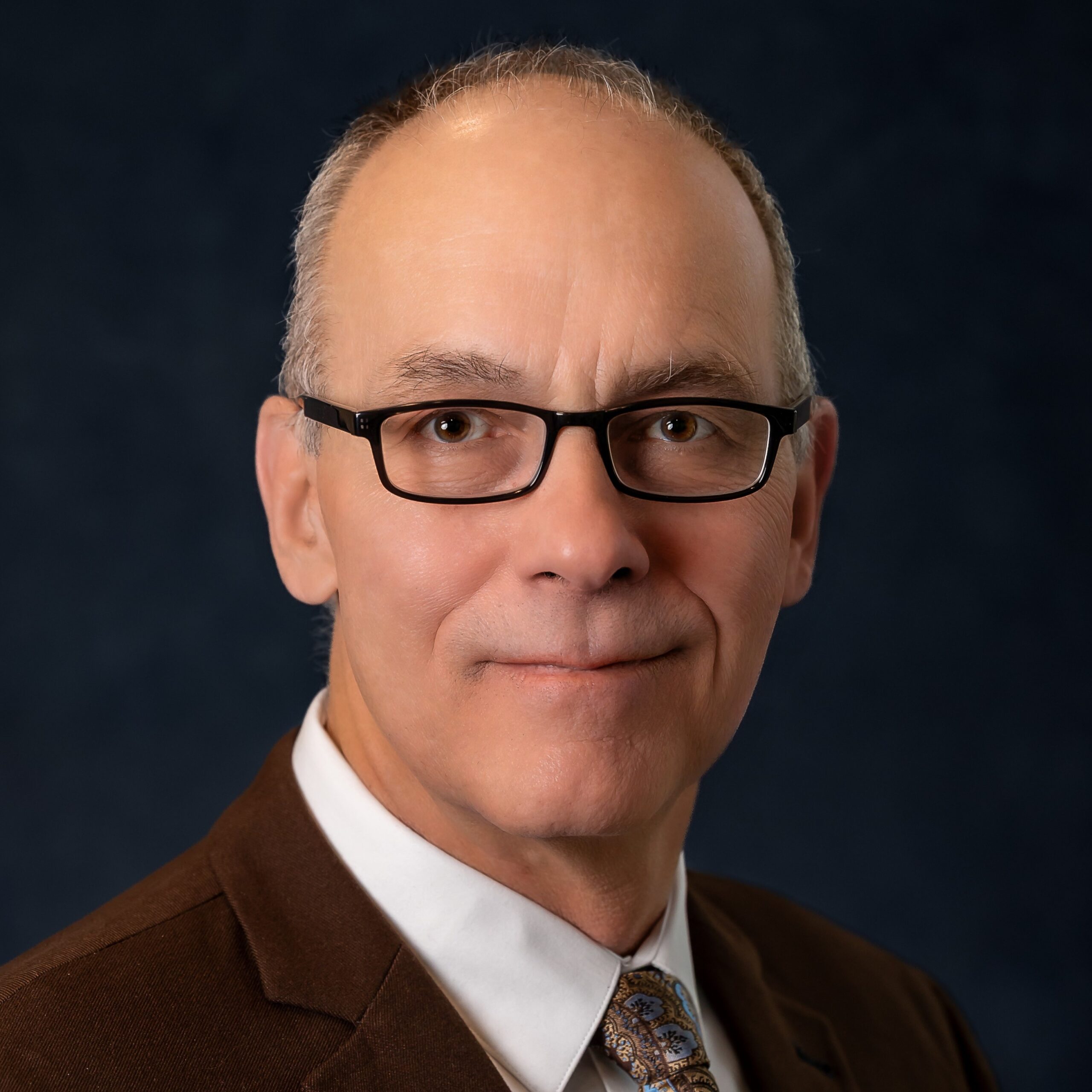
Maximum Length of Completion
Each single-degree DO student must complete the DO degree within a maximum of 6 years. To see the full policy click the button below
Make MCOM your next step
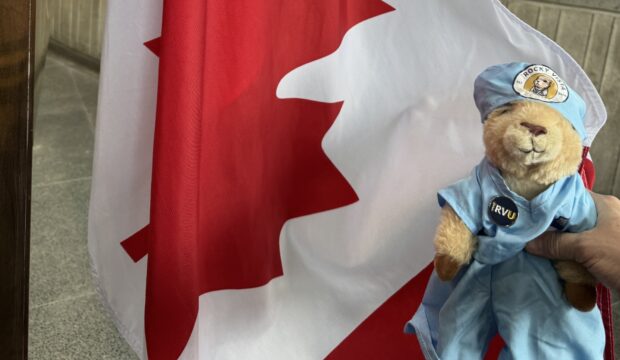
MCOM – Doctor of Osteopathic Medicine
Celebrating Canada Day: Reflections from RVU’s Canadian Students
Read more- MCOM – Doctor of Osteopathic Medicine
The Healing Practice: Yoga as a Tool for Medical Student Well-Being
Read more- MCOM – Doctor of Osteopathic Medicine
June is Brain Awareness Month: How to Keep Your Mind Sharp as You Age
Read more- MCOM – Doctor of Osteopathic Medicine
RVU Montana Conducts Mass Casualty Drill
Read moreContact the Office of Admissions
Montana Campus
4130 Rocky Vista Way
Billings, MT 59106
406-901-2700
For faster response, please direct inquiries to: [email protected]
*Based on internal data as of 08/13/2024.
